Contribute
| Lokvani Talks To Dr Thomas Abraham, Chairman, GOPIO |
Nirmala Garimella
06/29/2006
Dr. Abraham has been serving the NRI/PIO community for the last 32 years. He served as the first president of the Federation of Indian Associations of New York and the National Federation of Indian American Associations. Dr. Abraham currently serves as the Chairman of Global Organization of People of Indian Origin (GOPIO) which he founded in 1989 and as Chairman of the Board of Directors of Indian American Kerala Center in New York. Dr. Abraham also served as the Co-Chairman of the fund raising campaign to institute a chair for Indian studies at Columbia University. Two other groups initiated by Dr. Abraham are National Indian American Association for Senior Citizens (NIAASC) and South Asian Council for Social Services (SACSS). A graduate of Columbia University, Dr. Abraham is a materials scientist by profession and is President of Innovative Research and Products, Inc., an industry and market research firm based in Stamford, CT, USA. Dr. Abraham’s field of expertise is in advanced materials and nanotechnology.
Can you give us a background on how GOPIO started?
I served as the first president of the Federation of Indian Associations of New York in 1980 and the National Federation of Indian American Associations. At that time when we were taking broader issues of the Indian American community, the major concern that was affecting the global community was the human rights issue in different parts of the world. This included some of the people who were not in the political mainstream especially in Guyana and were thrown out of power and in Fiji when an Indian elected for government was thrown out in a coup in 1988. Apartheid still existed in South Africa and here at home there was the issue of the dot busters in NJ/NY. During this period, the advantage that Indian Americans had was we were different from the groups in the other parts of the world. Education level was high and there were more people interested in civic and community activities. So we decided to take up some of these issues and set up a committee to explore them. At that time communication was not as easy as there was no internet and we had to personally go and meet people in other places. Finally this effort led to a conference in 1989 in New York City and the Government of India extended its support and sent a delegation headed by Madhav Rao Scindia. We had around 3000 delegates from 26 countries and that is how GOPIO (Global Organization of People of Indian Origin) was born.
Do NRI’s all over the world share common interests that bring them together?
It is a difficult task to bring people of Indian origin together. We coined the word PIO (People of Indian Origin) and that is because during the convention when we termed them as Overseas Indians, we found that in some countries it had a political conflict internally like in Trinidad and Guyana and Fiji. Also PIO’s of third, fourth and fifth generation have a different agenda than people of first generation whether it is in the US, Canada, UK, Australia or contract workers in the Middle East. Differences in all these groups do exist. We had to come out with a common agenda that will interest all of us. It took some time but we did come to the conclusion that globally we share some common interests that we incorporated in our constitution available on our website. http://www.gopio.net/
What were the issues that were discussed at the recent convention in Hyderabad?
We had several issues that we brought to the attention of the Government of India. GOPIO monitors issues that are of larger interest to the community. Some resolutions that we adopted were Voting rights for Indian Citizens living outside of India, Price Differentiation for PIO’s for hotels and archeological sites, restoring ‘not ordinarily a resident status from two years to nine years on global tax of returning PIO’s/NRI’s and a demand for Rajya Sabha seats for NRI’s. Other issues were repealing the new VCA clearance rules for adoption of orphaned children from India and protection of real estate investments.
We initiated the PIO card and Dual Nationality resolution. It took some time but in 2001 PIO card was introduced and after a long times, dual nationality (Overseas Citizenship) was recognized in early January of this year.
Is GOPIO very active globally?
Oh Yes! It is very active in Europe, in Africa and in the Caribbean islands. New groups are being formed in Spain and Portugal. We don’t replicate the activities of local organizations. It is more broad based and really a civic front of the community; we encourage them to join the local activities. We have adopted the experiment of the Rotary international and the Lions international for our chapters. Originally we had country chapters and we found that it was not the correct way of doing it because some countries are large and it is difficult for members to meet and discuss. If 5 or more people are interested we ask them to build and initiate a chapter in their city. US has chapters in New York (3 chapters) Washington, Los Angeles, Chicago, Orlando, Miami and Detroit. Membership all over the world is in two categories: individual membership could be around 10,000 members (local and decentralized) and we have 250 life members.
Could you tell more about your most recent initiative on Youth participation?
College students have developed a network and after they graduate they have professional groups for activities of their interest. It is the high school children that are not well organized and we thought it a good idea to cultivate this group by providing services to the local community or even helping in charities in India, cities, villages and schools in bringing a civic awareness among the people. We have just started this initiative from New York and we feel it has great potential for expansion.
What are the challenges to an organization like GOPIO today?
The biggest challenge is meeting as a community on an Indian platform which is not easy. Unlike the Jewish community that had the issue of human rights around the world, we do not have any thing to rally. The only way we can participate in a movement that will benefit us all is to show that the world is becoming smaller, the economic boundaries of the countries are breaking and that on a global scale, ethnic identity has become an important thing.. Every country is now promoting their Diaspora, whether it is Italy, or the Scandinavian or Chinese who are doing extremely well. Now the most successful and emerging Diaspora is the Indian Diaspora and we will play a major role in the world. To bring them together you have to tell them what it is in it for them. That is where we come in GOPIO – pooling our resources and networking that will help our country professionally as well as financially and help communities wherever they need help. To me that is the only way we can join this movement. It is a challenge because there is no issue on a personal basis for a successful Indian American. But here is something that we can accomplish as a global community whether it is a charitable issue, or a humanitarian issue, or a human tragedy as a Katrina here or an earthquake in Pakistan. And those are some of the compelling issues that can bring people under the GOPIO umbrella.
To learn more go to www.gopio.net
You may also access this article through our web-site http://www.lokvani.com/
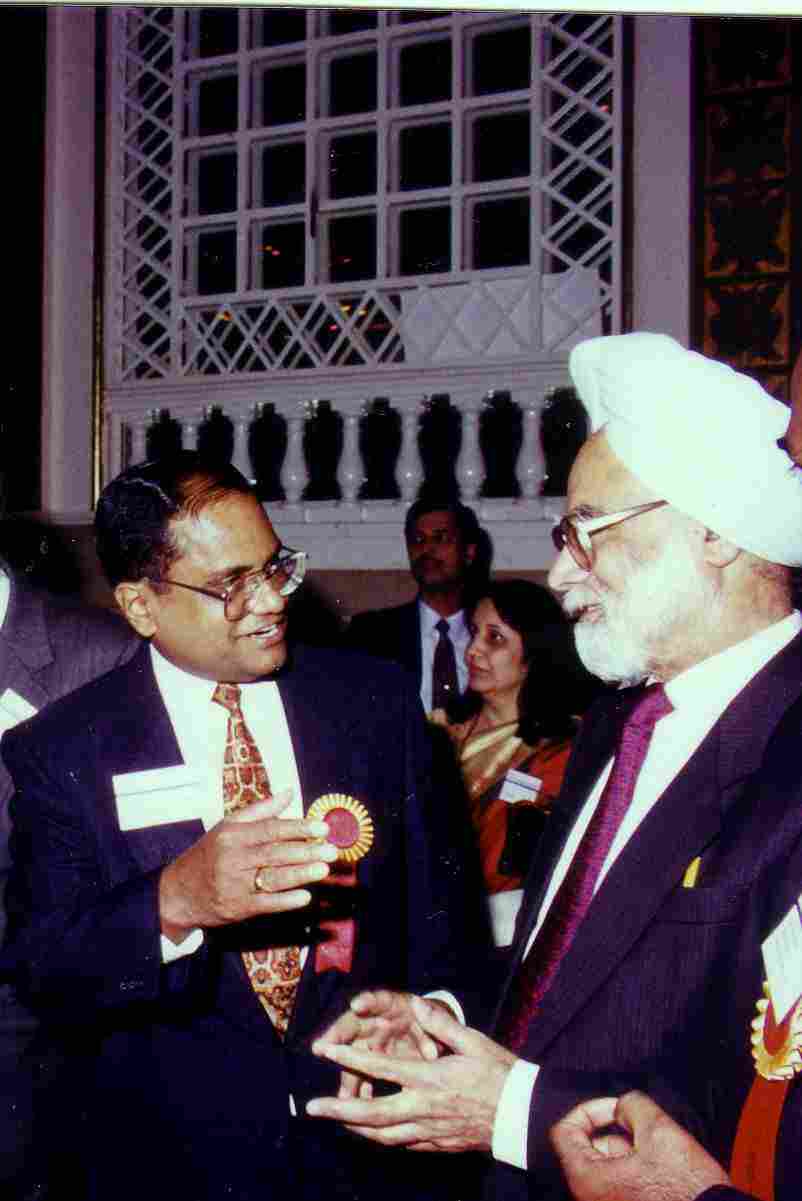
Dr. Thomas Abraham with Prime Minister Dr. Manmohan Singh in New York
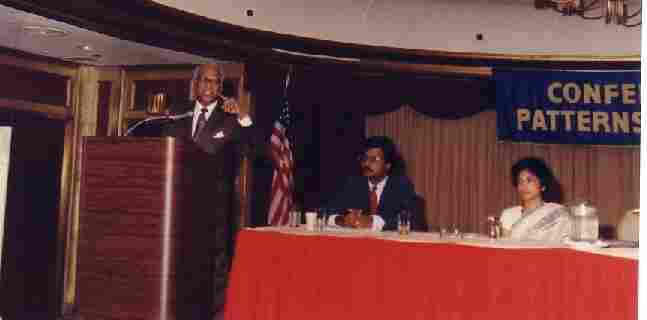
Former Guyana President Dr. Cheddi Speaks at the First Global Convention of People of Indian Origin New York in August 1989
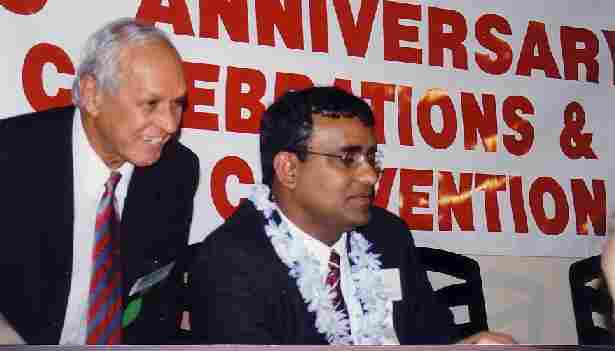
Guyana President Bharrat Jagdeo at the GOPIO Convention 1999 with GOPIO Executive VP Yesu Persaud.
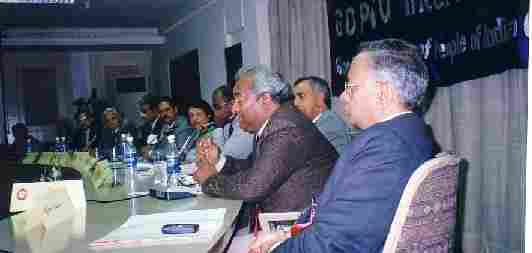
GOPIO 2003 Conference in New Delhi
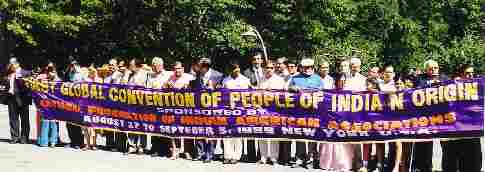
Delegates of the First Global Convention of People of Indian Origin present convention resolutions at the United Nations on Sept. 2, 1989.
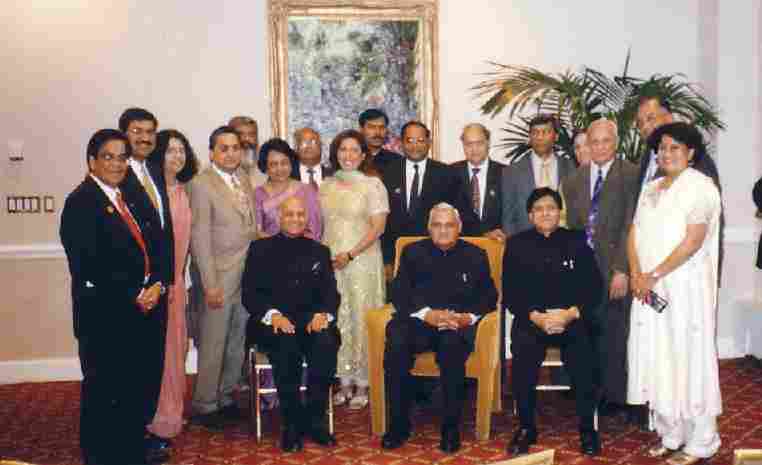
GOPIO delegation calls on Prime Minister Atal Bihari Vajpayee and submits resolutions after the Third Global Indian Entrepreneurs Meeting in New York on Sept. 13, 2002